HND Business Law Assignment: Nature of Legal Systems and Solutions
VerifiedAdded on 2023/01/19
|18
|4085
|69
Report
AI Summary
This business law report provides a comprehensive overview of the UK legal system and its implications for businesses. Section 1 delves into the nature of the legal system, differentiating between civil and criminal law, and exploring the sources of law, including statutory and common law. It examines the role of government in law-making, key legislation, regulations, and standards relevant to new businesses, and analyzes the impact of laws on business operations. Furthermore, the report critically reflects on the strengths and weaknesses of the UK legal system and introduces different types of business organizations, evaluating their advantages and disadvantages. Section 2 focuses on legal solutions for resolving business disputes and explores various sources of legal advice. The report concludes with a critical analysis of the provided information, offering insights into how businesses can navigate the legal landscape and address potential challenges. The report uses examples to demonstrate the practical application of business law principles.
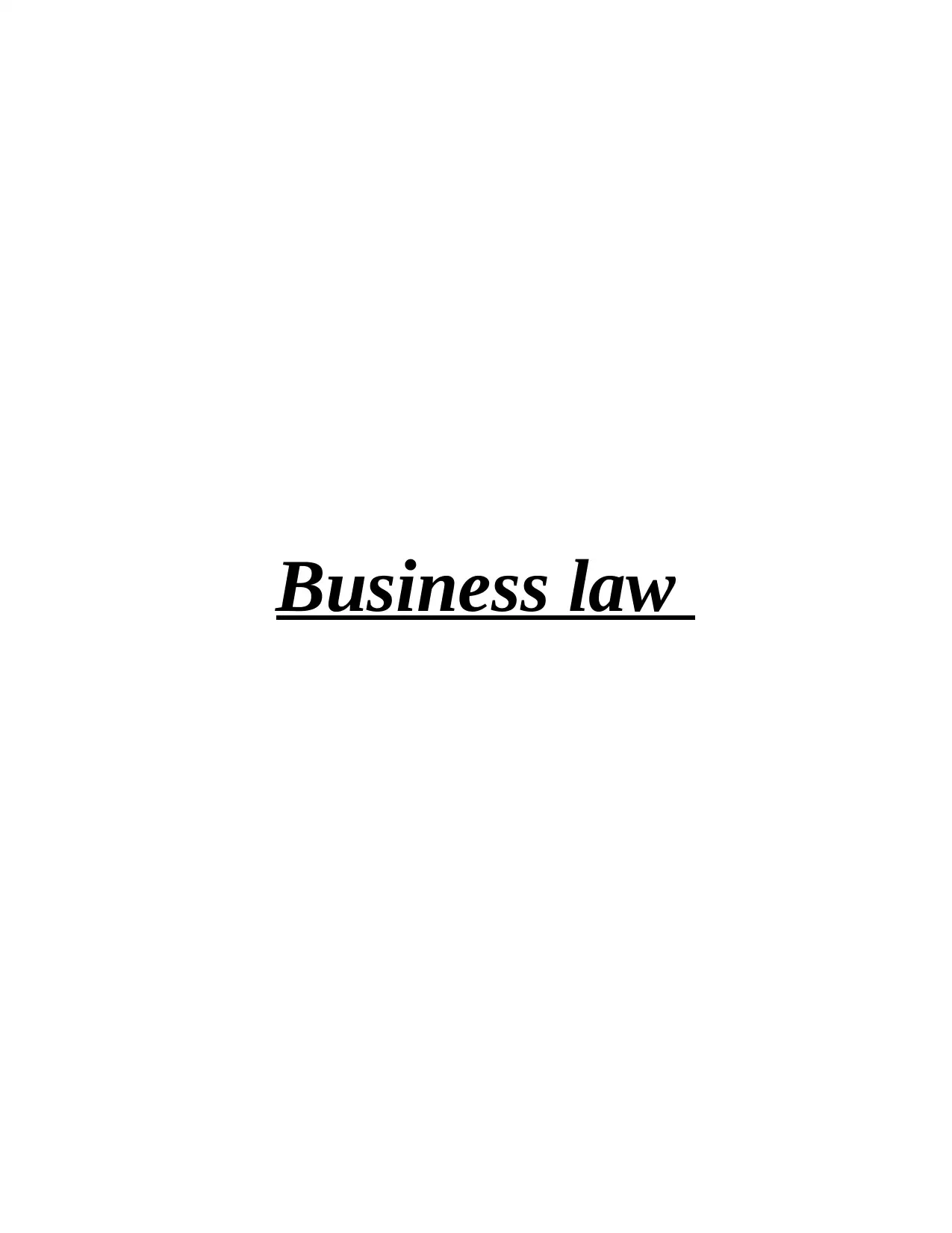
Business law
Paraphrase This Document
Need a fresh take? Get an instant paraphrase of this document with our AI Paraphraser
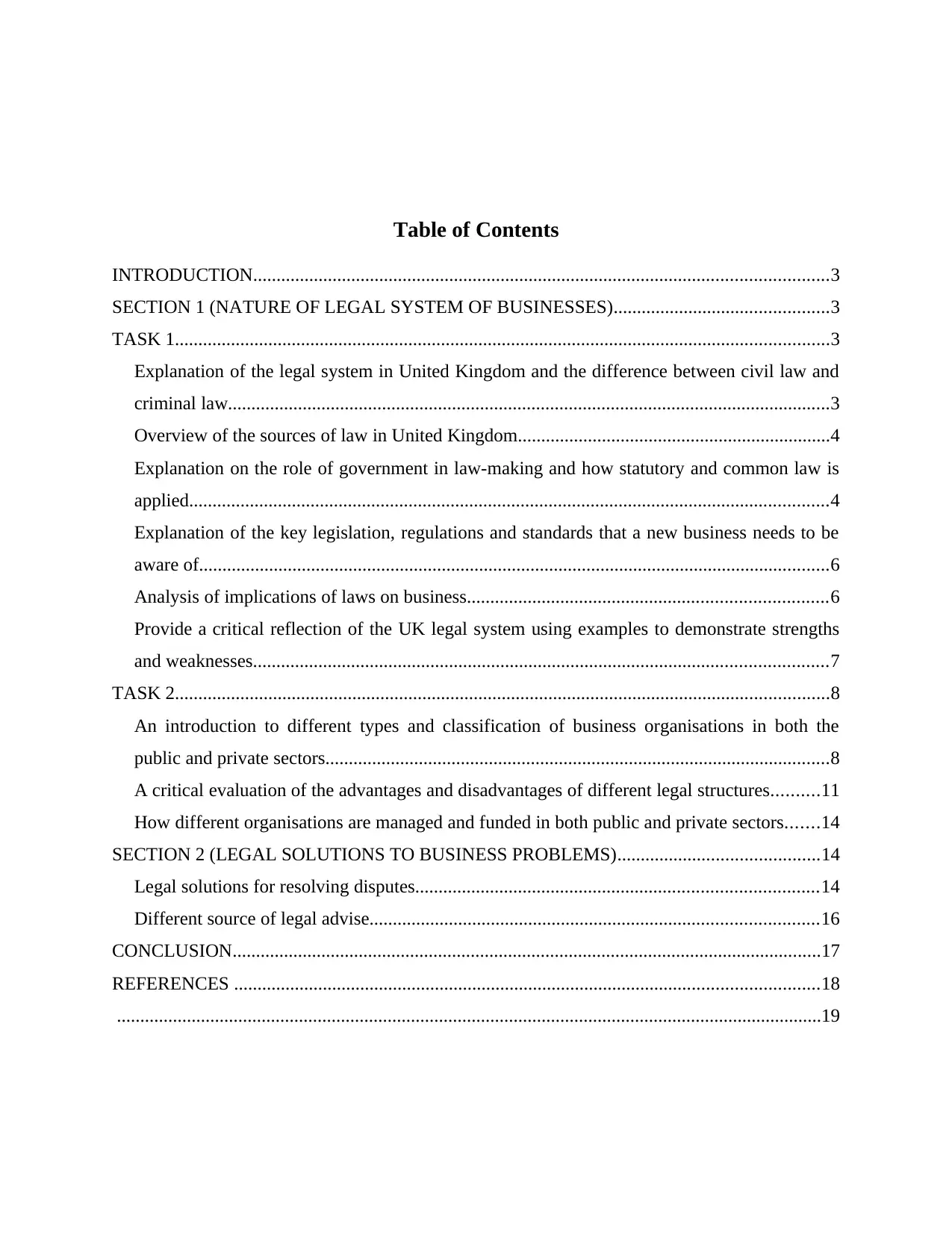
Table of Contents
INTRODUCTION...........................................................................................................................3
SECTION 1 (NATURE OF LEGAL SYSTEM OF BUSINESSES)..............................................3
TASK 1............................................................................................................................................3
Explanation of the legal system in United Kingdom and the difference between civil law and
criminal law.................................................................................................................................3
Overview of the sources of law in United Kingdom...................................................................4
Explanation on the role of government in law-making and how statutory and common law is
applied.........................................................................................................................................4
Explanation of the key legislation, regulations and standards that a new business needs to be
aware of.......................................................................................................................................6
Analysis of implications of laws on business.............................................................................6
Provide a critical reflection of the UK legal system using examples to demonstrate strengths
and weaknesses...........................................................................................................................7
TASK 2............................................................................................................................................8
An introduction to different types and classification of business organisations in both the
public and private sectors............................................................................................................8
A critical evaluation of the advantages and disadvantages of different legal structures..........11
How different organisations are managed and funded in both public and private sectors.......14
SECTION 2 (LEGAL SOLUTIONS TO BUSINESS PROBLEMS)...........................................14
Legal solutions for resolving disputes......................................................................................14
Different source of legal advise................................................................................................16
CONCLUSION..............................................................................................................................17
REFERENCES .............................................................................................................................18
.......................................................................................................................................................19
INTRODUCTION...........................................................................................................................3
SECTION 1 (NATURE OF LEGAL SYSTEM OF BUSINESSES)..............................................3
TASK 1............................................................................................................................................3
Explanation of the legal system in United Kingdom and the difference between civil law and
criminal law.................................................................................................................................3
Overview of the sources of law in United Kingdom...................................................................4
Explanation on the role of government in law-making and how statutory and common law is
applied.........................................................................................................................................4
Explanation of the key legislation, regulations and standards that a new business needs to be
aware of.......................................................................................................................................6
Analysis of implications of laws on business.............................................................................6
Provide a critical reflection of the UK legal system using examples to demonstrate strengths
and weaknesses...........................................................................................................................7
TASK 2............................................................................................................................................8
An introduction to different types and classification of business organisations in both the
public and private sectors............................................................................................................8
A critical evaluation of the advantages and disadvantages of different legal structures..........11
How different organisations are managed and funded in both public and private sectors.......14
SECTION 2 (LEGAL SOLUTIONS TO BUSINESS PROBLEMS)...........................................14
Legal solutions for resolving disputes......................................................................................14
Different source of legal advise................................................................................................16
CONCLUSION..............................................................................................................................17
REFERENCES .............................................................................................................................18
.......................................................................................................................................................19
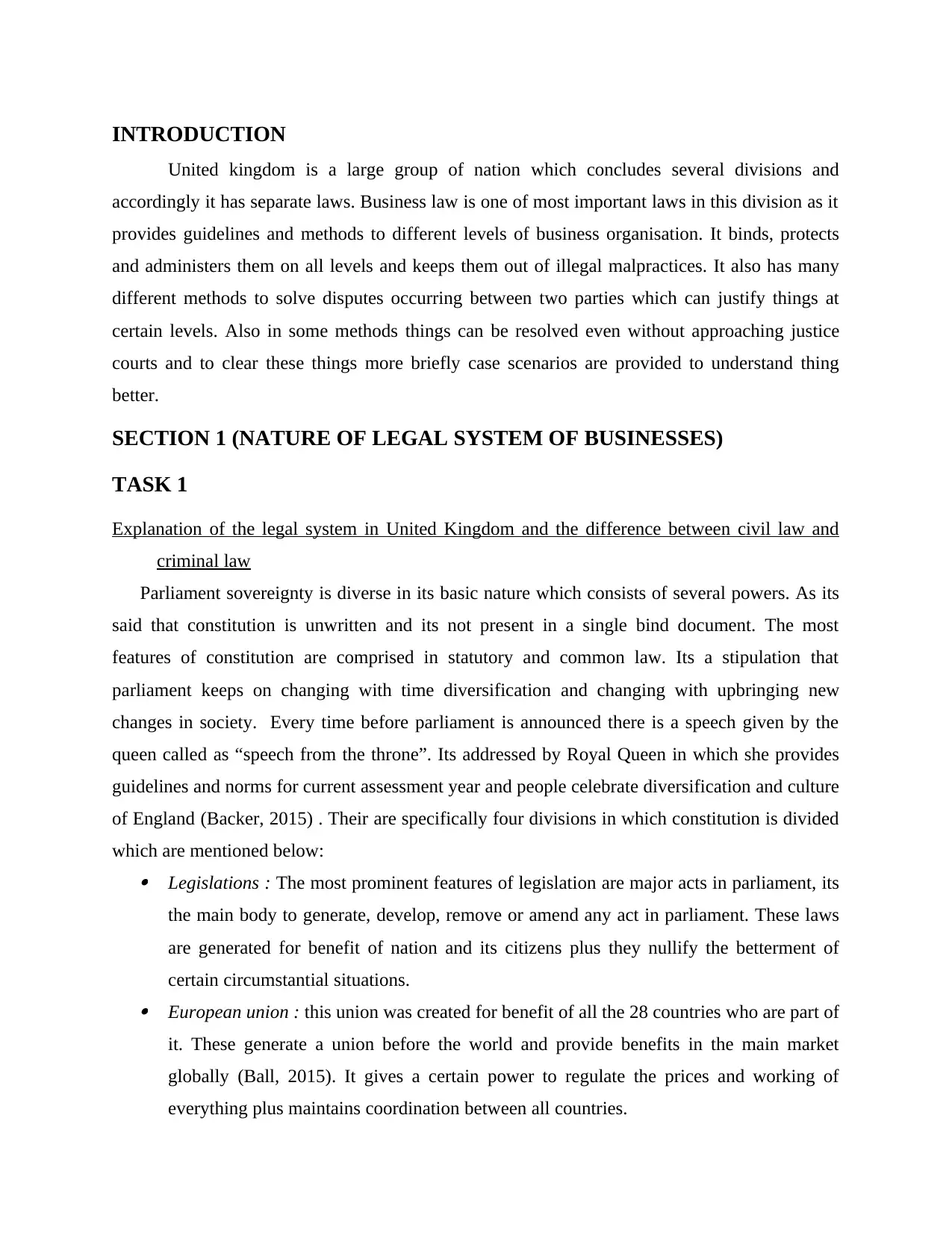
INTRODUCTION
United kingdom is a large group of nation which concludes several divisions and
accordingly it has separate laws. Business law is one of most important laws in this division as it
provides guidelines and methods to different levels of business organisation. It binds, protects
and administers them on all levels and keeps them out of illegal malpractices. It also has many
different methods to solve disputes occurring between two parties which can justify things at
certain levels. Also in some methods things can be resolved even without approaching justice
courts and to clear these things more briefly case scenarios are provided to understand thing
better.
SECTION 1 (NATURE OF LEGAL SYSTEM OF BUSINESSES)
TASK 1
Explanation of the legal system in United Kingdom and the difference between civil law and
criminal law
Parliament sovereignty is diverse in its basic nature which consists of several powers. As its
said that constitution is unwritten and its not present in a single bind document. The most
features of constitution are comprised in statutory and common law. Its a stipulation that
parliament keeps on changing with time diversification and changing with upbringing new
changes in society. Every time before parliament is announced there is a speech given by the
queen called as “speech from the throne”. Its addressed by Royal Queen in which she provides
guidelines and norms for current assessment year and people celebrate diversification and culture
of England (Backer, 2015) . Their are specifically four divisions in which constitution is divided
which are mentioned below: Legislations : The most prominent features of legislation are major acts in parliament, its
the main body to generate, develop, remove or amend any act in parliament. These laws
are generated for benefit of nation and its citizens plus they nullify the betterment of
certain circumstantial situations. European union : this union was created for benefit of all the 28 countries who are part of
it. These generate a union before the world and provide benefits in the main market
globally (Ball, 2015). It gives a certain power to regulate the prices and working of
everything plus maintains coordination between all countries.
United kingdom is a large group of nation which concludes several divisions and
accordingly it has separate laws. Business law is one of most important laws in this division as it
provides guidelines and methods to different levels of business organisation. It binds, protects
and administers them on all levels and keeps them out of illegal malpractices. It also has many
different methods to solve disputes occurring between two parties which can justify things at
certain levels. Also in some methods things can be resolved even without approaching justice
courts and to clear these things more briefly case scenarios are provided to understand thing
better.
SECTION 1 (NATURE OF LEGAL SYSTEM OF BUSINESSES)
TASK 1
Explanation of the legal system in United Kingdom and the difference between civil law and
criminal law
Parliament sovereignty is diverse in its basic nature which consists of several powers. As its
said that constitution is unwritten and its not present in a single bind document. The most
features of constitution are comprised in statutory and common law. Its a stipulation that
parliament keeps on changing with time diversification and changing with upbringing new
changes in society. Every time before parliament is announced there is a speech given by the
queen called as “speech from the throne”. Its addressed by Royal Queen in which she provides
guidelines and norms for current assessment year and people celebrate diversification and culture
of England (Backer, 2015) . Their are specifically four divisions in which constitution is divided
which are mentioned below: Legislations : The most prominent features of legislation are major acts in parliament, its
the main body to generate, develop, remove or amend any act in parliament. These laws
are generated for benefit of nation and its citizens plus they nullify the betterment of
certain circumstantial situations. European union : this union was created for benefit of all the 28 countries who are part of
it. These generate a union before the world and provide benefits in the main market
globally (Ball, 2015). It gives a certain power to regulate the prices and working of
everything plus maintains coordination between all countries.
⊘ This is a preview!⊘
Do you want full access?
Subscribe today to unlock all pages.

Trusted by 1+ million students worldwide
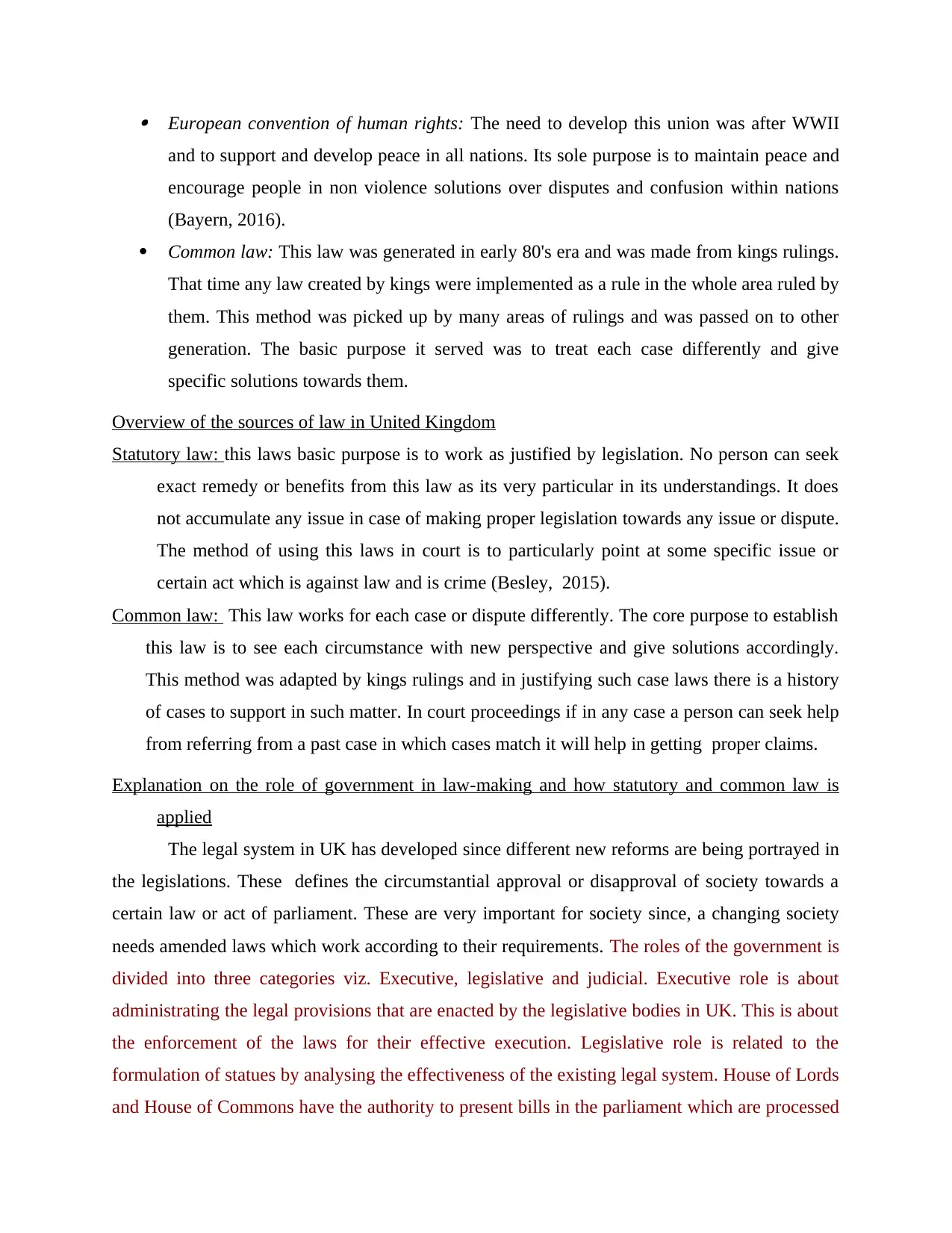
European convention of human rights: The need to develop this union was after WWII
and to support and develop peace in all nations. Its sole purpose is to maintain peace and
encourage people in non violence solutions over disputes and confusion within nations
(Bayern, 2016).
Common law: This law was generated in early 80's era and was made from kings rulings.
That time any law created by kings were implemented as a rule in the whole area ruled by
them. This method was picked up by many areas of rulings and was passed on to other
generation. The basic purpose it served was to treat each case differently and give
specific solutions towards them.
Overview of the sources of law in United Kingdom
Statutory law: this laws basic purpose is to work as justified by legislation. No person can seek
exact remedy or benefits from this law as its very particular in its understandings. It does
not accumulate any issue in case of making proper legislation towards any issue or dispute.
The method of using this laws in court is to particularly point at some specific issue or
certain act which is against law and is crime (Besley, 2015).
Common law: This law works for each case or dispute differently. The core purpose to establish
this law is to see each circumstance with new perspective and give solutions accordingly.
This method was adapted by kings rulings and in justifying such case laws there is a history
of cases to support in such matter. In court proceedings if in any case a person can seek help
from referring from a past case in which cases match it will help in getting proper claims.
Explanation on the role of government in law-making and how statutory and common law is
applied
The legal system in UK has developed since different new reforms are being portrayed in
the legislations. These defines the circumstantial approval or disapproval of society towards a
certain law or act of parliament. These are very important for society since, a changing society
needs amended laws which work according to their requirements. The roles of the government is
divided into three categories viz. Executive, legislative and judicial. Executive role is about
administrating the legal provisions that are enacted by the legislative bodies in UK. This is about
the enforcement of the laws for their effective execution. Legislative role is related to the
formulation of statues by analysing the effectiveness of the existing legal system. House of Lords
and House of Commons have the authority to present bills in the parliament which are processed
and to support and develop peace in all nations. Its sole purpose is to maintain peace and
encourage people in non violence solutions over disputes and confusion within nations
(Bayern, 2016).
Common law: This law was generated in early 80's era and was made from kings rulings.
That time any law created by kings were implemented as a rule in the whole area ruled by
them. This method was picked up by many areas of rulings and was passed on to other
generation. The basic purpose it served was to treat each case differently and give
specific solutions towards them.
Overview of the sources of law in United Kingdom
Statutory law: this laws basic purpose is to work as justified by legislation. No person can seek
exact remedy or benefits from this law as its very particular in its understandings. It does
not accumulate any issue in case of making proper legislation towards any issue or dispute.
The method of using this laws in court is to particularly point at some specific issue or
certain act which is against law and is crime (Besley, 2015).
Common law: This law works for each case or dispute differently. The core purpose to establish
this law is to see each circumstance with new perspective and give solutions accordingly.
This method was adapted by kings rulings and in justifying such case laws there is a history
of cases to support in such matter. In court proceedings if in any case a person can seek help
from referring from a past case in which cases match it will help in getting proper claims.
Explanation on the role of government in law-making and how statutory and common law is
applied
The legal system in UK has developed since different new reforms are being portrayed in
the legislations. These defines the circumstantial approval or disapproval of society towards a
certain law or act of parliament. These are very important for society since, a changing society
needs amended laws which work according to their requirements. The roles of the government is
divided into three categories viz. Executive, legislative and judicial. Executive role is about
administrating the legal provisions that are enacted by the legislative bodies in UK. This is about
the enforcement of the laws for their effective execution. Legislative role is related to the
formulation of statues by analysing the effectiveness of the existing legal system. House of Lords
and House of Commons have the authority to present bills in the parliament which are processed
Paraphrase This Document
Need a fresh take? Get an instant paraphrase of this document with our AI Paraphraser
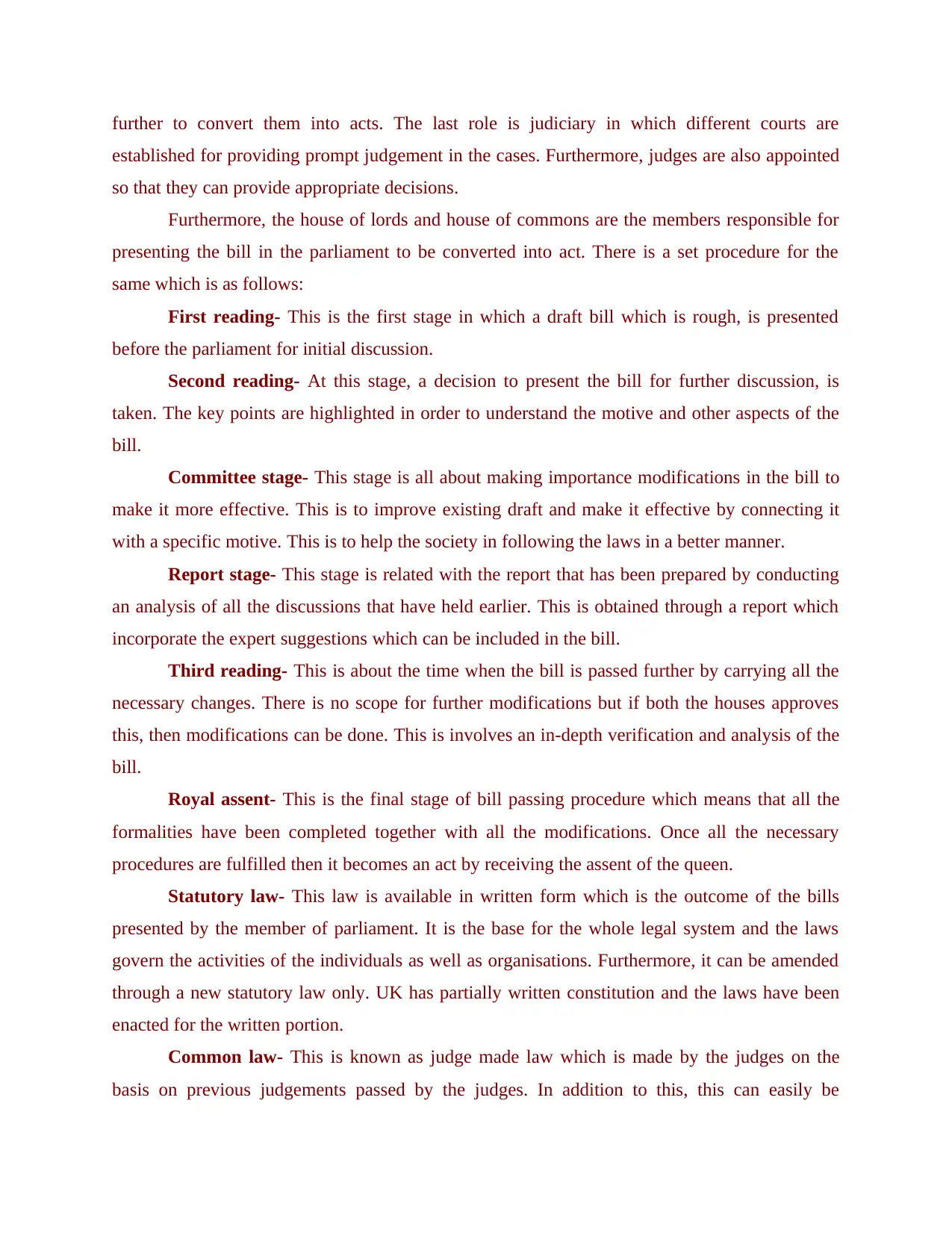
further to convert them into acts. The last role is judiciary in which different courts are
established for providing prompt judgement in the cases. Furthermore, judges are also appointed
so that they can provide appropriate decisions.
Furthermore, the house of lords and house of commons are the members responsible for
presenting the bill in the parliament to be converted into act. There is a set procedure for the
same which is as follows:
First reading- This is the first stage in which a draft bill which is rough, is presented
before the parliament for initial discussion.
Second reading- At this stage, a decision to present the bill for further discussion, is
taken. The key points are highlighted in order to understand the motive and other aspects of the
bill.
Committee stage- This stage is all about making importance modifications in the bill to
make it more effective. This is to improve existing draft and make it effective by connecting it
with a specific motive. This is to help the society in following the laws in a better manner.
Report stage- This stage is related with the report that has been prepared by conducting
an analysis of all the discussions that have held earlier. This is obtained through a report which
incorporate the expert suggestions which can be included in the bill.
Third reading- This is about the time when the bill is passed further by carrying all the
necessary changes. There is no scope for further modifications but if both the houses approves
this, then modifications can be done. This is involves an in-depth verification and analysis of the
bill.
Royal assent- This is the final stage of bill passing procedure which means that all the
formalities have been completed together with all the modifications. Once all the necessary
procedures are fulfilled then it becomes an act by receiving the assent of the queen.
Statutory law- This law is available in written form which is the outcome of the bills
presented by the member of parliament. It is the base for the whole legal system and the laws
govern the activities of the individuals as well as organisations. Furthermore, it can be amended
through a new statutory law only. UK has partially written constitution and the laws have been
enacted for the written portion.
Common law- This is known as judge made law which is made by the judges on the
basis on previous judgements passed by the judges. In addition to this, this can easily be
established for providing prompt judgement in the cases. Furthermore, judges are also appointed
so that they can provide appropriate decisions.
Furthermore, the house of lords and house of commons are the members responsible for
presenting the bill in the parliament to be converted into act. There is a set procedure for the
same which is as follows:
First reading- This is the first stage in which a draft bill which is rough, is presented
before the parliament for initial discussion.
Second reading- At this stage, a decision to present the bill for further discussion, is
taken. The key points are highlighted in order to understand the motive and other aspects of the
bill.
Committee stage- This stage is all about making importance modifications in the bill to
make it more effective. This is to improve existing draft and make it effective by connecting it
with a specific motive. This is to help the society in following the laws in a better manner.
Report stage- This stage is related with the report that has been prepared by conducting
an analysis of all the discussions that have held earlier. This is obtained through a report which
incorporate the expert suggestions which can be included in the bill.
Third reading- This is about the time when the bill is passed further by carrying all the
necessary changes. There is no scope for further modifications but if both the houses approves
this, then modifications can be done. This is involves an in-depth verification and analysis of the
bill.
Royal assent- This is the final stage of bill passing procedure which means that all the
formalities have been completed together with all the modifications. Once all the necessary
procedures are fulfilled then it becomes an act by receiving the assent of the queen.
Statutory law- This law is available in written form which is the outcome of the bills
presented by the member of parliament. It is the base for the whole legal system and the laws
govern the activities of the individuals as well as organisations. Furthermore, it can be amended
through a new statutory law only. UK has partially written constitution and the laws have been
enacted for the written portion.
Common law- This is known as judge made law which is made by the judges on the
basis on previous judgements passed by the judges. In addition to this, this can easily be
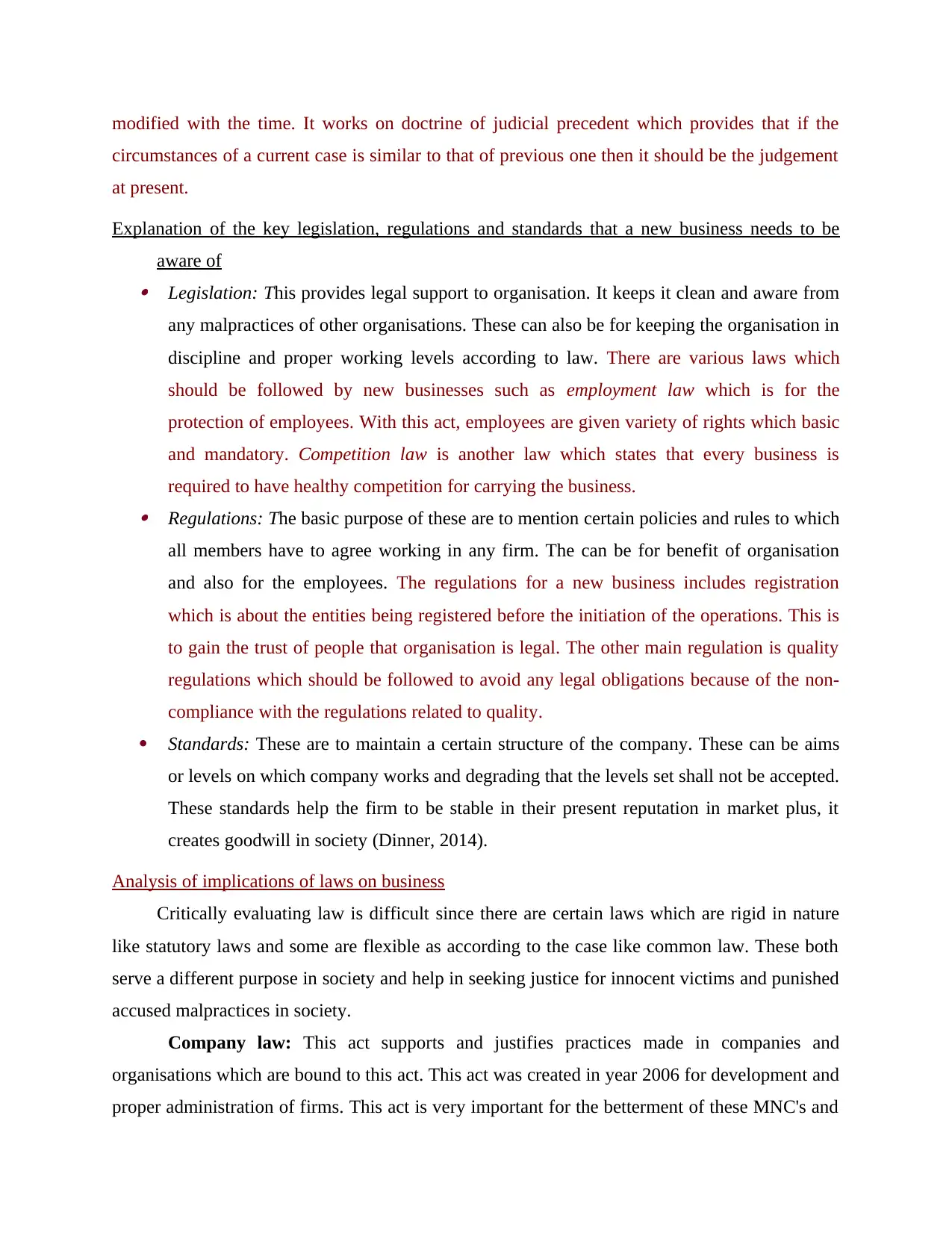
modified with the time. It works on doctrine of judicial precedent which provides that if the
circumstances of a current case is similar to that of previous one then it should be the judgement
at present.
Explanation of the key legislation, regulations and standards that a new business needs to be
aware of Legislation: This provides legal support to organisation. It keeps it clean and aware from
any malpractices of other organisations. These can also be for keeping the organisation in
discipline and proper working levels according to law. There are various laws which
should be followed by new businesses such as employment law which is for the
protection of employees. With this act, employees are given variety of rights which basic
and mandatory. Competition law is another law which states that every business is
required to have healthy competition for carrying the business. Regulations: The basic purpose of these are to mention certain policies and rules to which
all members have to agree working in any firm. The can be for benefit of organisation
and also for the employees. The regulations for a new business includes registration
which is about the entities being registered before the initiation of the operations. This is
to gain the trust of people that organisation is legal. The other main regulation is quality
regulations which should be followed to avoid any legal obligations because of the non-
compliance with the regulations related to quality.
Standards: These are to maintain a certain structure of the company. These can be aims
or levels on which company works and degrading that the levels set shall not be accepted.
These standards help the firm to be stable in their present reputation in market plus, it
creates goodwill in society (Dinner, 2014).
Analysis of implications of laws on business
Critically evaluating law is difficult since there are certain laws which are rigid in nature
like statutory laws and some are flexible as according to the case like common law. These both
serve a different purpose in society and help in seeking justice for innocent victims and punished
accused malpractices in society.
Company law: This act supports and justifies practices made in companies and
organisations which are bound to this act. This act was created in year 2006 for development and
proper administration of firms. This act is very important for the betterment of these MNC's and
circumstances of a current case is similar to that of previous one then it should be the judgement
at present.
Explanation of the key legislation, regulations and standards that a new business needs to be
aware of Legislation: This provides legal support to organisation. It keeps it clean and aware from
any malpractices of other organisations. These can also be for keeping the organisation in
discipline and proper working levels according to law. There are various laws which
should be followed by new businesses such as employment law which is for the
protection of employees. With this act, employees are given variety of rights which basic
and mandatory. Competition law is another law which states that every business is
required to have healthy competition for carrying the business. Regulations: The basic purpose of these are to mention certain policies and rules to which
all members have to agree working in any firm. The can be for benefit of organisation
and also for the employees. The regulations for a new business includes registration
which is about the entities being registered before the initiation of the operations. This is
to gain the trust of people that organisation is legal. The other main regulation is quality
regulations which should be followed to avoid any legal obligations because of the non-
compliance with the regulations related to quality.
Standards: These are to maintain a certain structure of the company. These can be aims
or levels on which company works and degrading that the levels set shall not be accepted.
These standards help the firm to be stable in their present reputation in market plus, it
creates goodwill in society (Dinner, 2014).
Analysis of implications of laws on business
Critically evaluating law is difficult since there are certain laws which are rigid in nature
like statutory laws and some are flexible as according to the case like common law. These both
serve a different purpose in society and help in seeking justice for innocent victims and punished
accused malpractices in society.
Company law: This act supports and justifies practices made in companies and
organisations which are bound to this act. This act was created in year 2006 for development and
proper administration of firms. This act is very important for the betterment of these MNC's and
⊘ This is a preview!⊘
Do you want full access?
Subscribe today to unlock all pages.

Trusted by 1+ million students worldwide
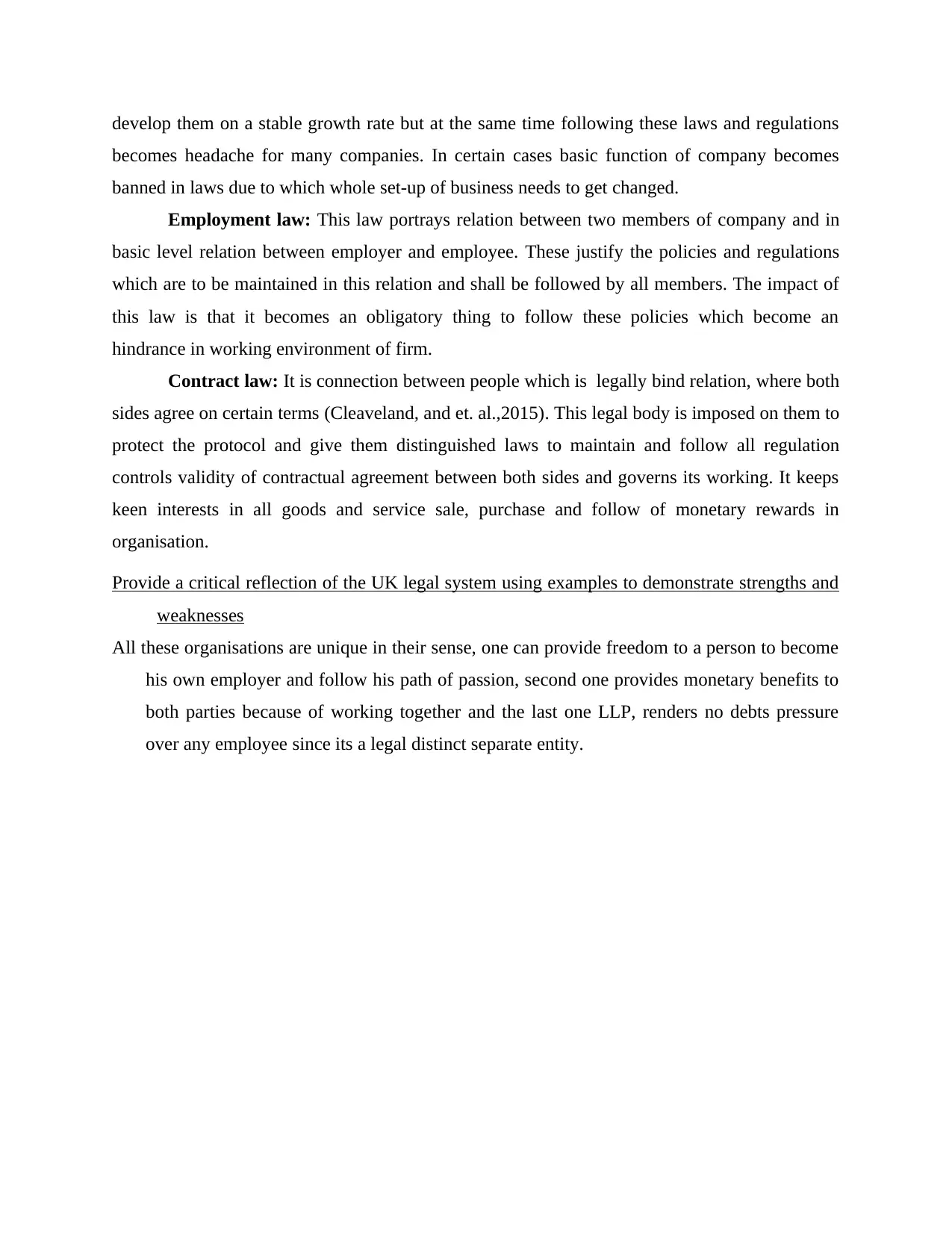
develop them on a stable growth rate but at the same time following these laws and regulations
becomes headache for many companies. In certain cases basic function of company becomes
banned in laws due to which whole set-up of business needs to get changed.
Employment law: This law portrays relation between two members of company and in
basic level relation between employer and employee. These justify the policies and regulations
which are to be maintained in this relation and shall be followed by all members. The impact of
this law is that it becomes an obligatory thing to follow these policies which become an
hindrance in working environment of firm.
Contract law: It is connection between people which is legally bind relation, where both
sides agree on certain terms (Cleaveland, and et. al.,2015). This legal body is imposed on them to
protect the protocol and give them distinguished laws to maintain and follow all regulation
controls validity of contractual agreement between both sides and governs its working. It keeps
keen interests in all goods and service sale, purchase and follow of monetary rewards in
organisation.
Provide a critical reflection of the UK legal system using examples to demonstrate strengths and
weaknesses
All these organisations are unique in their sense, one can provide freedom to a person to become
his own employer and follow his path of passion, second one provides monetary benefits to
both parties because of working together and the last one LLP, renders no debts pressure
over any employee since its a legal distinct separate entity.
becomes headache for many companies. In certain cases basic function of company becomes
banned in laws due to which whole set-up of business needs to get changed.
Employment law: This law portrays relation between two members of company and in
basic level relation between employer and employee. These justify the policies and regulations
which are to be maintained in this relation and shall be followed by all members. The impact of
this law is that it becomes an obligatory thing to follow these policies which become an
hindrance in working environment of firm.
Contract law: It is connection between people which is legally bind relation, where both
sides agree on certain terms (Cleaveland, and et. al.,2015). This legal body is imposed on them to
protect the protocol and give them distinguished laws to maintain and follow all regulation
controls validity of contractual agreement between both sides and governs its working. It keeps
keen interests in all goods and service sale, purchase and follow of monetary rewards in
organisation.
Provide a critical reflection of the UK legal system using examples to demonstrate strengths and
weaknesses
All these organisations are unique in their sense, one can provide freedom to a person to become
his own employer and follow his path of passion, second one provides monetary benefits to
both parties because of working together and the last one LLP, renders no debts pressure
over any employee since its a legal distinct separate entity.
Paraphrase This Document
Need a fresh take? Get an instant paraphrase of this document with our AI Paraphraser
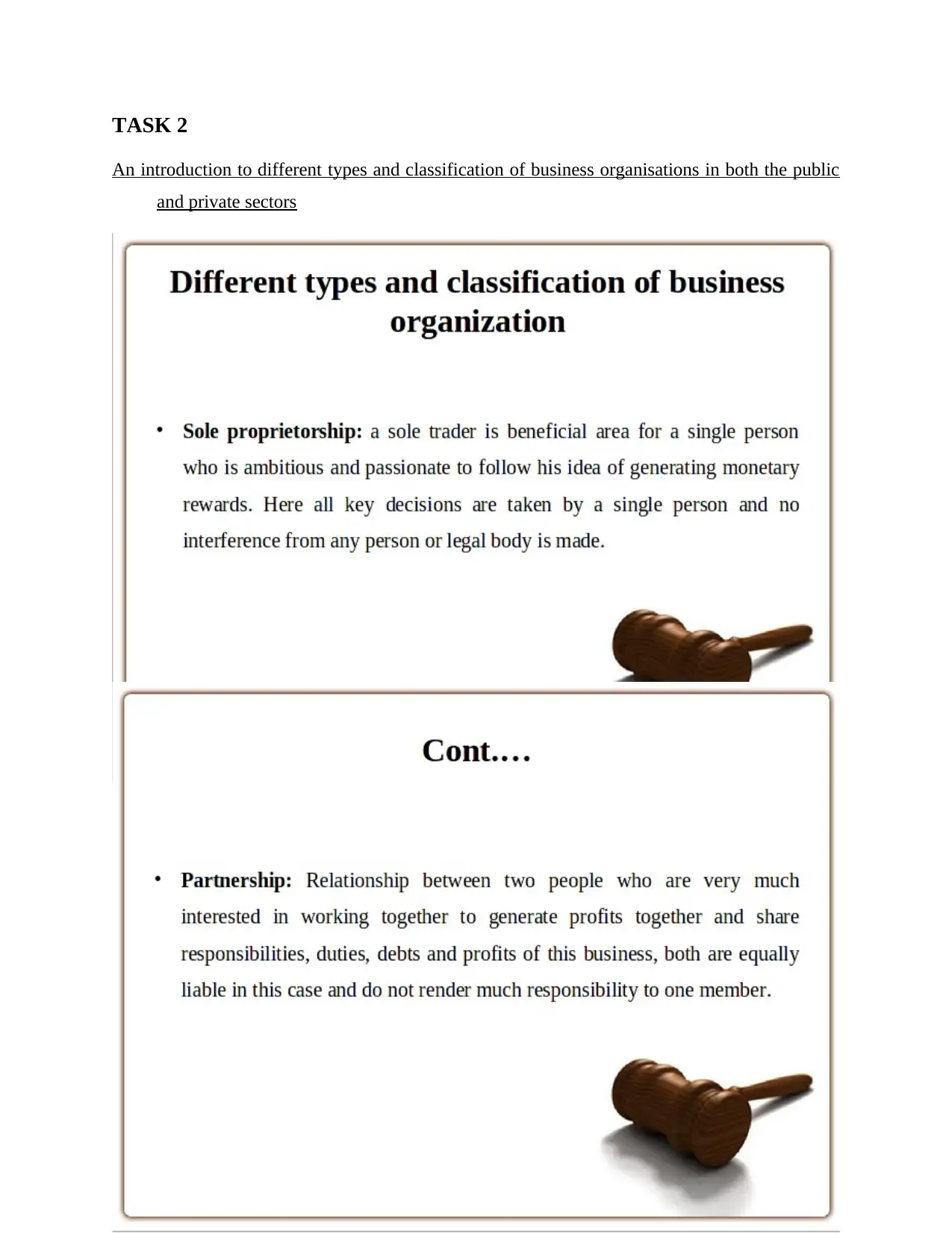
TASK 2
An introduction to different types and classification of business organisations in both the public
and private sectors
An introduction to different types and classification of business organisations in both the public
and private sectors
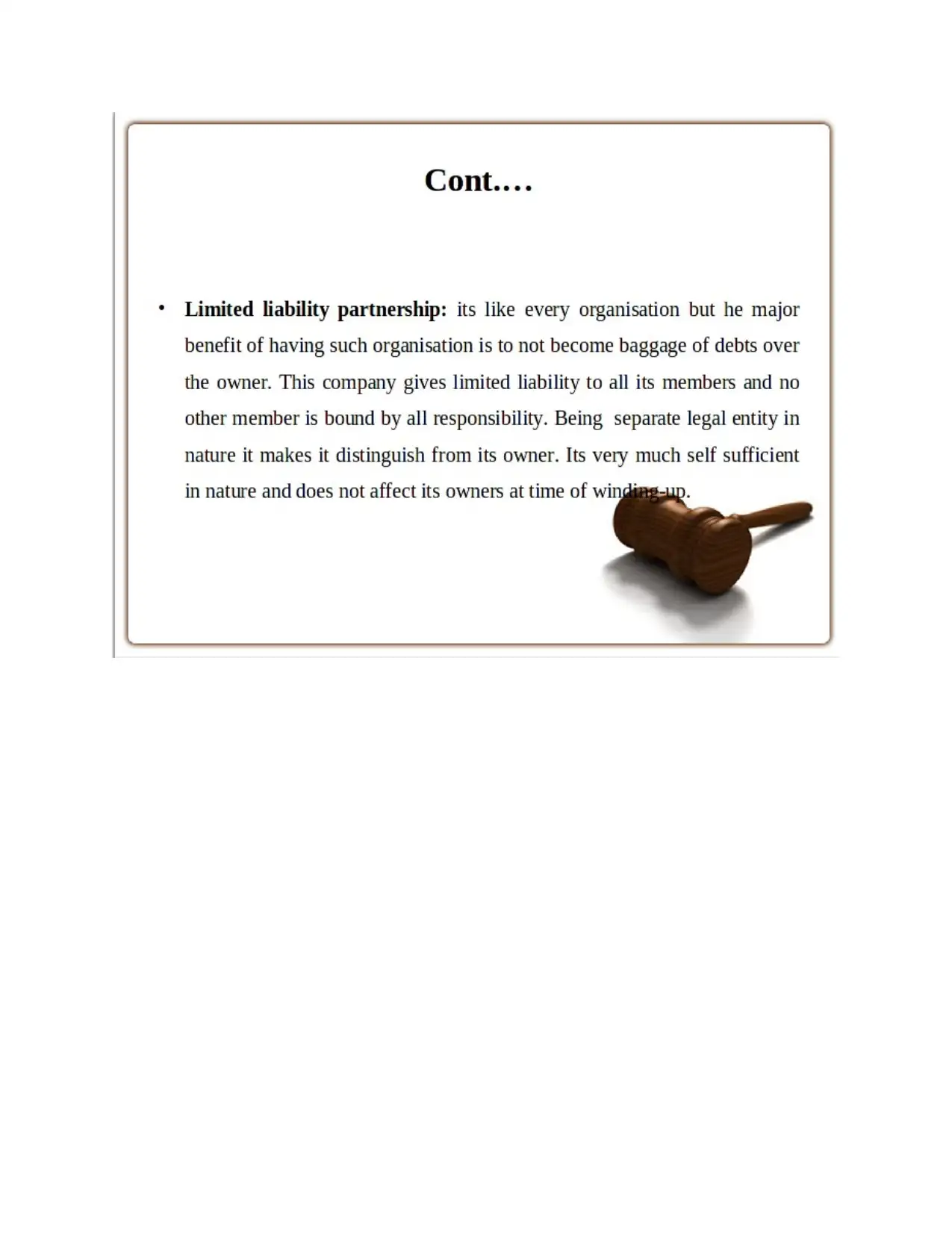
⊘ This is a preview!⊘
Do you want full access?
Subscribe today to unlock all pages.

Trusted by 1+ million students worldwide
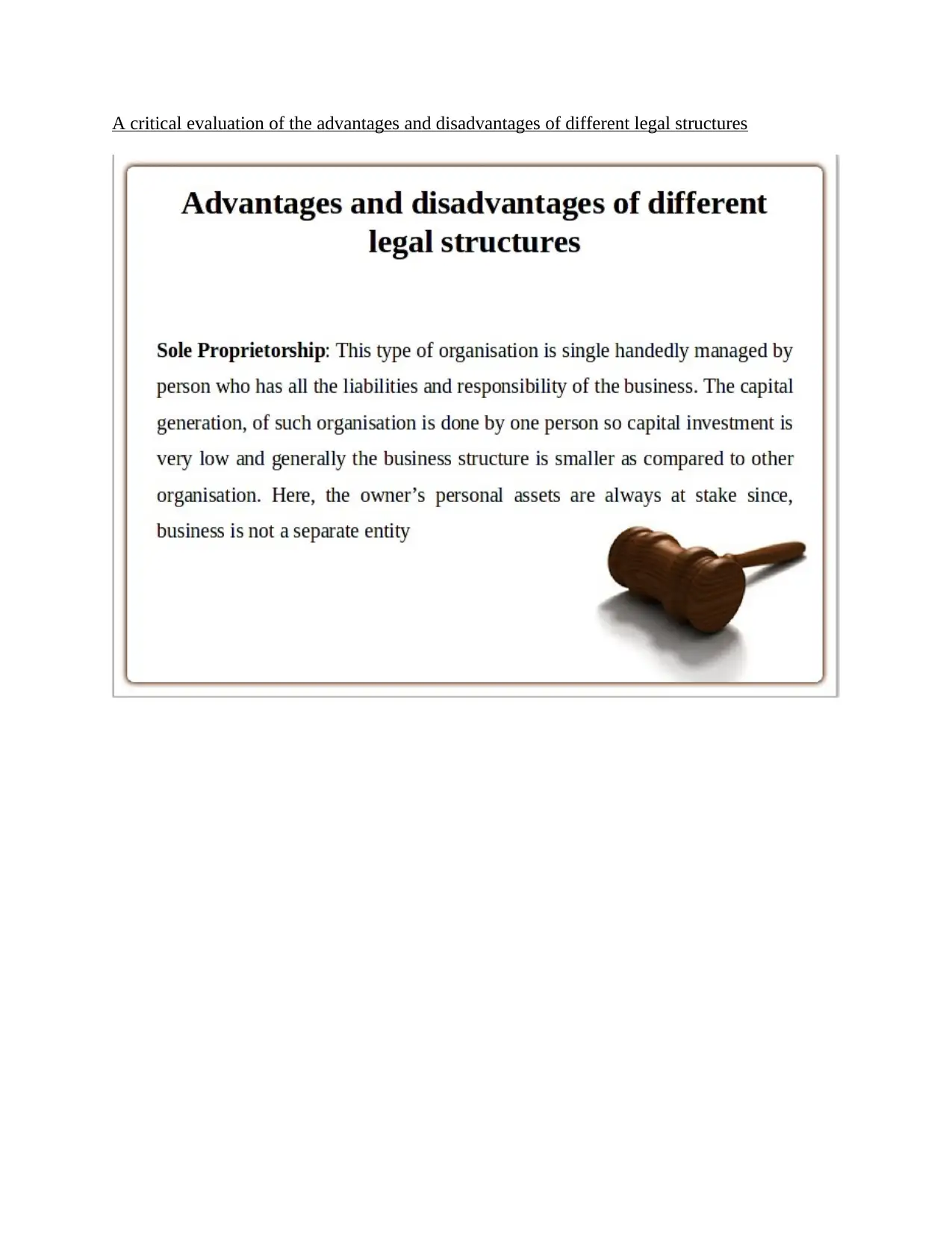
A critical evaluation of the advantages and disadvantages of different legal structures
Paraphrase This Document
Need a fresh take? Get an instant paraphrase of this document with our AI Paraphraser
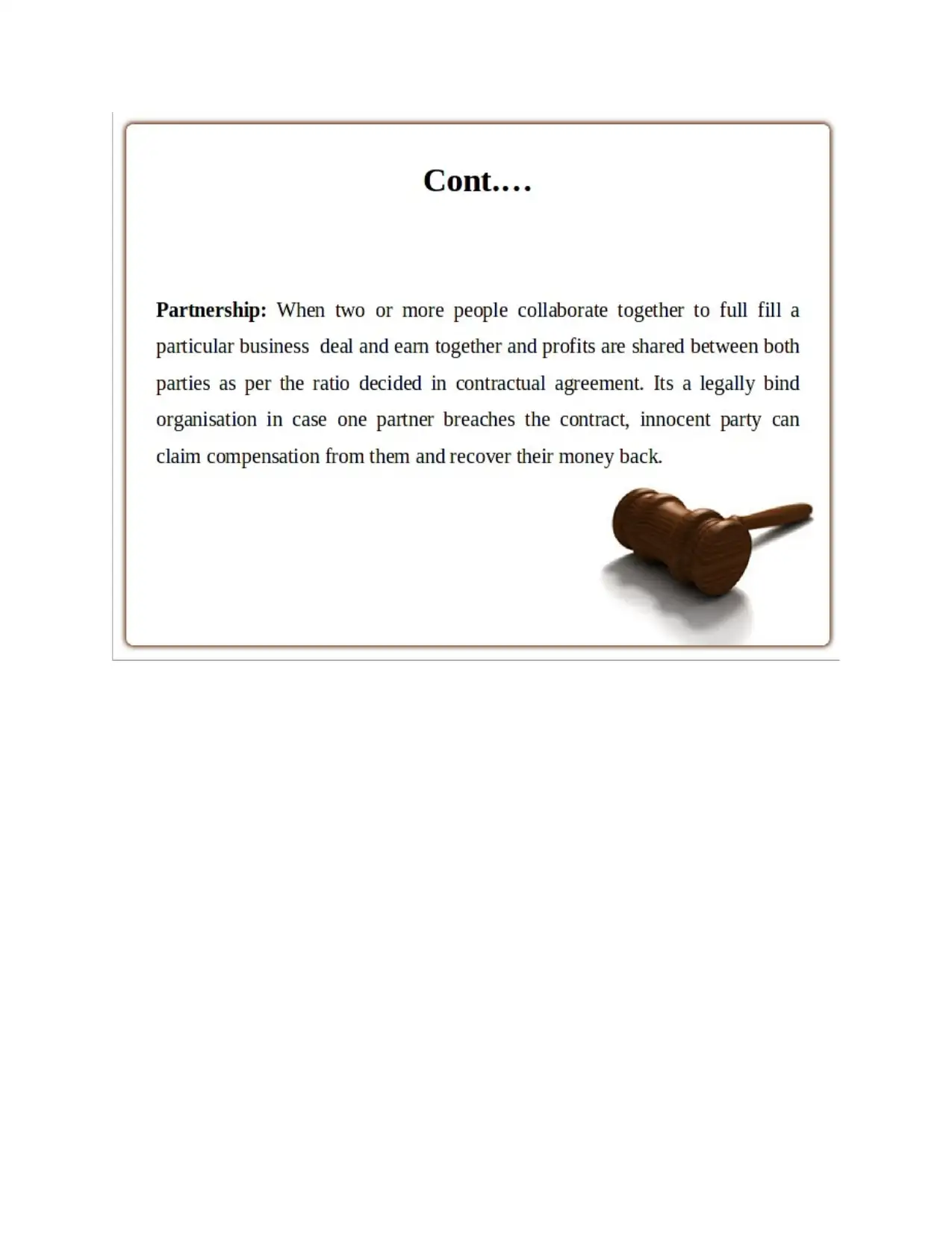
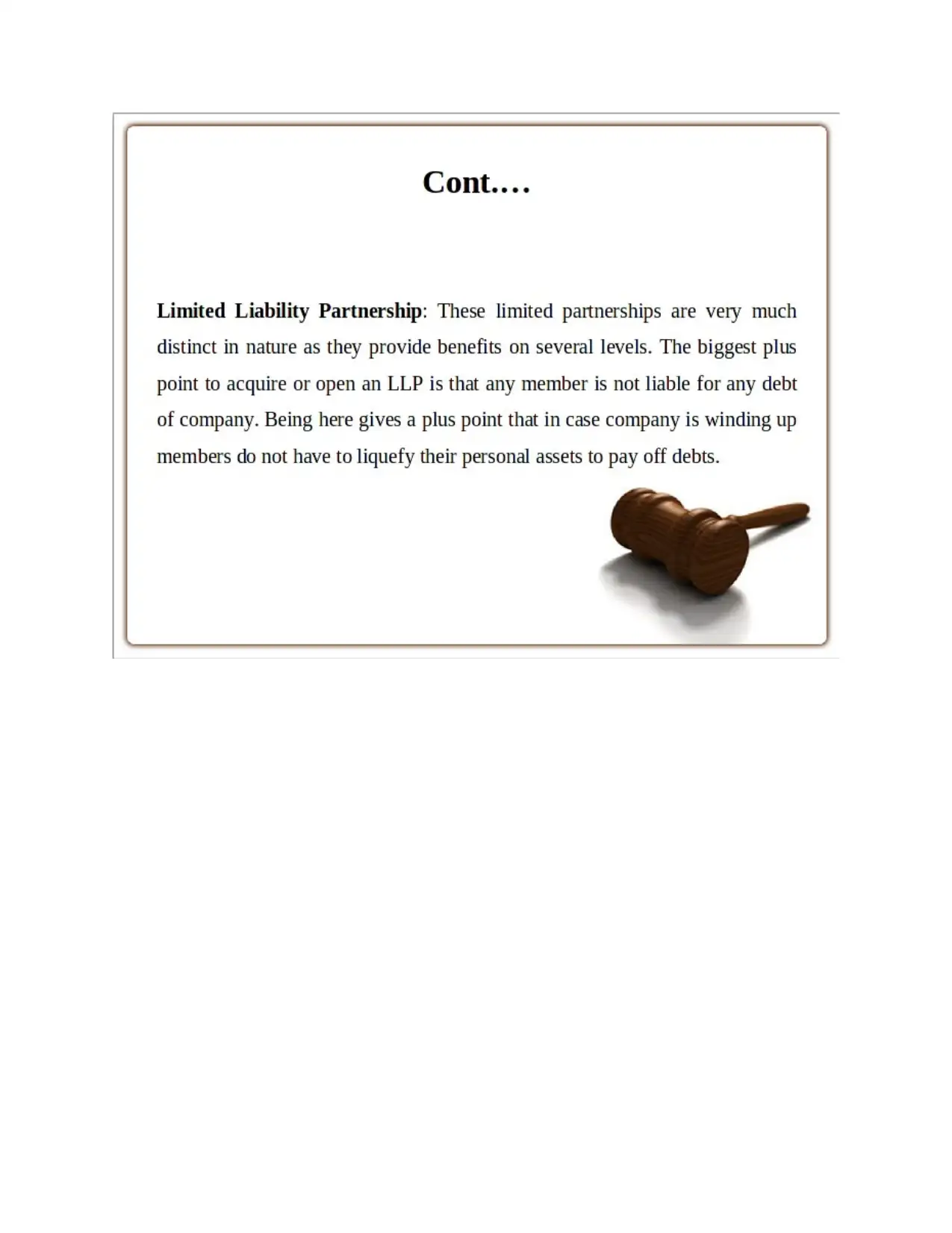
⊘ This is a preview!⊘
Do you want full access?
Subscribe today to unlock all pages.

Trusted by 1+ million students worldwide
1 out of 18
Related Documents
Your All-in-One AI-Powered Toolkit for Academic Success.
+13062052269
info@desklib.com
Available 24*7 on WhatsApp / Email
![[object Object]](/_next/static/media/star-bottom.7253800d.svg)
Unlock your academic potential
Copyright © 2020–2025 A2Z Services. All Rights Reserved. Developed and managed by ZUCOL.





